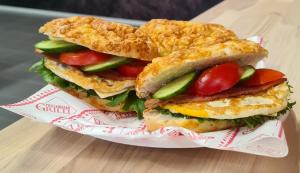Carccu® Custom Printed Deli Paper Recognized in the Global Shift to PFAS-Free Food Packaging
This recognition comes at a time when the global food packaging industry is responding to increasing concerns over health and environmental risks associated with per- and polyfluoroalkyl substances (PFAS). Widely used for their resistance to grease and moisture, PFAS are being gradually phased out due to their persistence in the environment and potential links to health issues. According to Grand View Research, the PFAS-free food packaging market was valued at USD 40.4 billion in 2024 and is expected to reach USD 58.79 billion by 2030, growing at a compound annual growth rate (CAGR) of 6.5%.
Functional Barriers without PFAS
Deli papers used in professional kitchens must meet basic functional requirements, particularly effective resistance to grease and moisture. These features are essential for packaging foods such as pastries, burgers, and other items with high fat or oil content, and they must do so without compromising food safety.
Carccu® addresses these needs by using barrier coatings that do not rely on PFAS. Instead, the company applies alternative methods and materials designed to ensure sufficient protection for food contact use. These solutions are developed to meet food industry expectations while eliminating persistent chemicals.
Custom Printed Deli Paper for Restaurants and Food Services
Custom printing is a core element of Carccu®’s deli paper range. These papers can feature logos or design elements that support visual consistency and branding for food businesses. They are used in contexts such as restaurants, cafés, bakeries, and takeout services, serving both as wrappers and tray liners for a variety of food items.
With decades of experience in flexographic printing, Carccu works with clients to produce deli paper that meets day-to-day operational requirements. Water-based inks are used in the printing process to ensure compliance with food safety regulations, including the Swiss Ordinance, while maintaining clarity and durability of printed designs.
Wood-Based Materials Backed by Certifications
Carccu®'s deli papers are made from traceable wood-derived raw materials sourced from responsibly managed forests. These materials meet required standards for food safety and functionality and are certified under both the FSC® Chain of Custody (Forest Stewardship Council) and PEFC Chain of Custody (Programme for the Endorsement of Forest Certification).
Designed for industrial composting, the papers meet functional packaging needs while aligning with sourcing requirements. Their composition helps food businesses comply with expectations related to renewable and responsibly managed materials.
Deli Paper Production with Documented Environmental Standards
Safety-focused and resource-efficient methods are implemented throughout Carccu®’s operations. The production site in Sastamala, Finland, runs on 100% fossil-free electricity. A recycling rate of 99.9% is maintained, with 99.5% of side streams being repurposed.
The custom printed deli papers use water-based inks that meet Swiss Ordinance standards for food contact. Carccu® holds ISO 14001 certification and maintains FSC® and PEFC Chain of Custody certifications, ensuring traceable sourcing of materials.
Deli Paper Options in the Evolving Food Packaging Sector
Ongoing changes in food packaging standards and market developments have placed more emphasis on product safety, traceability, and visual consistency. In response, PFAS-free custom printed deli papers have become a practical choice in many segments of the food sector. Looking ahead, paper and paperboard are increasingly used in PFAS-free packaging because they work well with functional barrier technologies and meet evolving material standards. Carccu® contributes to this development through its work on deli papers that are designed to meet both performance expectations, regulatory requirements, and branding needs achieved via custom printing.
Lasse Borg
Carccu® / EPP-Pack Oy
+358 405134240
email us here
Visit us on social media:
LinkedIn
Legal Disclaimer:
EIN Presswire provides this news content "as is" without warranty of any kind. We do not accept any responsibility or liability for the accuracy, content, images, videos, licenses, completeness, legality, or reliability of the information contained in this article. If you have any complaints or copyright issues related to this article, kindly contact the author above.
LightBulbSurplus.com Expands LED Driver Selection with Over 212 Models Now Available
Medical Supplierz Partners with Leading Healthcare Brands to Expand Product Listings
Silicon Wafer Manufacturing Plant Setup Cost 2025: Investment, Machinery and Profit Margin
Więcej ważnych informacji
 Jedynka Newserii
Jedynka Newserii

 Jedynka Newserii
Jedynka Newserii

Handel

Polskie MŚP otrzymają większe wsparcie w ekspansji międzynarodowej. To cel nowej inicjatywy sześciu instytucji
Firmy z sektora małych i średnich przedsiębiorstw otrzymają kompleksowe wsparcie na potrzeby zwiększania konkurencyjności na arenie międzynarodowej. Taki jest cel wspólnej inicjatywy instytucji zrzeszonych w Grupie PFR pod szyldem Team Poland. Obejmuje ona zarówno wsparcie kapitałowe, w postaci gwarancji, pożyczek czy ubezpieczenia, jak i doradztwo oraz wsparcie promocyjne i informacyjne, dzięki czemu mikro-, małym i średnim firmom łatwiej będzie podjąć decyzję o ekspansji zagranicznej. Pierwszy projekt dotyczy wsparcia dla firm zainteresowanych uczestnictwem w odbudowie Ukrainy.
Bankowość
RPP zgodna co do potrzeby obniżania stóp procentowych. Trwają dyskusje dotyczące tempa tych decyzji

W lipcu Rada Polityki Pieniężnej po raz drugi w tym roku obniżyła stopy procentowe, określając swój ruch mianem dostosowania. W kolejnych miesiącach można oczekiwać kolejnych obniżek, ale ich tempo i termin będą zależeć od efektów dotychczasowych decyzji i wzrostu płac. Docelowo główna stopa procentowa ma wynosić 3,5 proc. Te okoliczności sprzyjają kredytobiorcom.
Handel
Umowa z krajami Mercosur coraz bliżej. W. Buda: Polska nie wykorzystała swojej prezydencji do jej zablokowania

– Polska podczas prezydencji w Radzie UE nie wykorzystała szansy na obronę swoich interesów w sprawie umowy z krajami Mercosur – ocenia europoseł PiS Waldemar Buda. W jego ocenie polski rząd, mimo sprzeciwu wobec zapisów umowy, nie zbudował w UE sojuszy niezbędnych do jej odrzucenia. Porozumienie o wolnym handlu spotyka się przede wszystkim z protestami europejskich rolników, którzy obawiają się zalania wspólnego rynku tańszą żywnością z krajów Ameryki Południowej. Według europosła wszystko może się rozegrać w najbliższych tygodniach.
Partner serwisu
Szkolenia

Akademia Newserii
Akademia Newserii to projekt, w ramach którego najlepsi polscy dziennikarze biznesowi, giełdowi oraz lifestylowi, a także szkoleniowcy z wieloletnim doświadczeniem dzielą się swoją wiedzą nt. pracy z mediami.





![Część środków z Planu Społeczno-Klimatycznego trafi na walkę z ubóstwem transportowym. Organizacje branżowe apelują o zmianę priorytetowych projektów [DEPESZA]](https://www.newseria.pl/files/1097841585/rower3,w_85,_small.jpg)




.gif)

 |
| |
| |
|